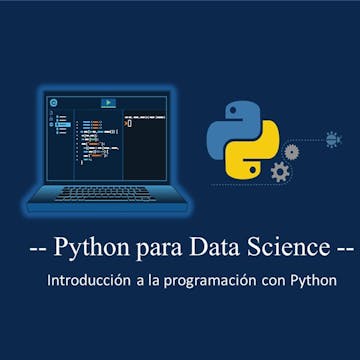
Good to know
Save this course
Reviews summary
Python for data science: practical and effective
Activities
Review basic Python skills
Show steps
Refresh your memory or learn the fundamentals of Python to prepare for this course.
Browse courses on
Python Basics
Show steps
-
Review the syntax of Python variables, data types, and operators.
-
Write a simple Python program to print 'Hello, world!'
Follow Python tutorials for beginners
Show steps
Enhance your understanding by following guided tutorials that cover the basics of Python.
Show steps
-
Find tutorials that cover topics such as variables, data types, conditional statements, and loops.
-
Follow the tutorials step-by-step and practice writing Python code.
Solve Python coding exercises
Show steps
Reinforce your understanding by solving coding exercises that focus on Python fundamentals.
Show steps
-
Find online platforms or books that provide Python coding exercises.
-
Solve the exercises and review the solutions to identify your strengths and areas for improvement.
Four other activities
Expand to see all activities and additional details
Show all seven activities
Join a Python study group
Show steps
Engage with other learners and discuss Python concepts, projects, and challenges through a study group.
Show steps
-
Find or create a study group with other Python learners.
-
Meet regularly to discuss course material, ask questions, and share knowledge.
Attend a Python workshop or webinar
Show steps
Expand your Python skills by attending a workshop or webinar that focuses on specific topics.
Show steps
-
Find workshops or webinars that cover topics relevant to the course.
-
Register and attend the workshop or webinar.
Participate in a Python coding competition
Show steps
Challenge yourself and test your Python skills by participating in a coding competition.
Show steps
-
Find coding competitions that are relevant to Python and your skill level.
-
Prepare for the competition by practicing Python coding.
-
Participate in the competition and showcase your Python skills.
Create a knowledge base of course materials
Show steps
Organize and summarize course materials to improve retention and understanding.
Show steps
-
Review course notes, slides, assignments, and any other relevant materials.
-
Create a summary or outline of key concepts and ideas.
Review basic Python skills
Show steps
Refresh your memory or learn the fundamentals of Python to prepare for this course.
Browse courses on
Python Basics
Show steps
- Review the syntax of Python variables, data types, and operators.
- Write a simple Python program to print 'Hello, world!'
Follow Python tutorials for beginners
Show steps
Enhance your understanding by following guided tutorials that cover the basics of Python.
Show steps
- Find tutorials that cover topics such as variables, data types, conditional statements, and loops.
- Follow the tutorials step-by-step and practice writing Python code.
Solve Python coding exercises
Show steps
Reinforce your understanding by solving coding exercises that focus on Python fundamentals.
Show steps
- Find online platforms or books that provide Python coding exercises.
- Solve the exercises and review the solutions to identify your strengths and areas for improvement.
Join a Python study group
Show steps
Engage with other learners and discuss Python concepts, projects, and challenges through a study group.
Show steps
- Find or create a study group with other Python learners.
- Meet regularly to discuss course material, ask questions, and share knowledge.
Attend a Python workshop or webinar
Show steps
Expand your Python skills by attending a workshop or webinar that focuses on specific topics.
Show steps
- Find workshops or webinars that cover topics relevant to the course.
- Register and attend the workshop or webinar.
Participate in a Python coding competition
Show steps
Challenge yourself and test your Python skills by participating in a coding competition.
Show steps
- Find coding competitions that are relevant to Python and your skill level.
- Prepare for the competition by practicing Python coding.
- Participate in the competition and showcase your Python skills.
Create a knowledge base of course materials
Show steps
Organize and summarize course materials to improve retention and understanding.
Show steps
- Review course notes, slides, assignments, and any other relevant materials.
- Create a summary or outline of key concepts and ideas.
Career center
Data Scientist
Machine Learning Engineer
Data Analyst
Software Engineer
Data Engineer
Business Analyst
Financial Analyst
Quantitative Analyst
Operations Research Analyst
Statistician
Actuary
Research Scientist
Data Journalist
Product Manager
Project Manager
Reading list
Share
Similar courses
OpenCourser helps millions of learners each year. People visit us to learn workspace skills, ace their exams, and nurture their curiosity.
Our extensive catalog contains over 50,000 courses and twice as many books. Browse by search, by topic, or even by career interests. We'll match you to the right resources quickly.
Find this site helpful? Tell a friend about us.
We're supported by our community of learners. When you purchase or subscribe to courses and programs or purchase books, we may earn a commission from our partners.
Your purchases help us maintain our catalog and keep our servers humming without ads.
Thank you for supporting OpenCourser.



